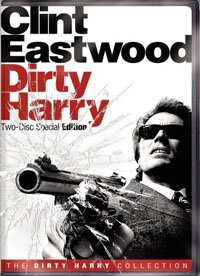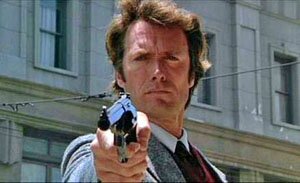I recently finished reading Stefan Kanfer’s Tough Without a Gun: The Life and Extraordinary Afterlife of Humphrey Bogart. (The title is from something Raymond Chandler said of Bogart.) So of course, I’m back to watching Bogart movies, at least for the time being.
Dirty Harry: should I like it as much as I do?
 I’ve always found Dirty Harry a troubling movie. Well, almost all of the earlier, image making movies of Clint Eastwood have been troubling to me, but Dirty Harry tops my list. The reason is simple: from the first time I saw it, I’ve loved the movie but I felt that I shouldn’t.
I’ve always found Dirty Harry a troubling movie. Well, almost all of the earlier, image making movies of Clint Eastwood have been troubling to me, but Dirty Harry tops my list. The reason is simple: from the first time I saw it, I’ve loved the movie but I felt that I shouldn’t.
The conflict is easy to explain. The movie is manipulated to have you cheering for Harry so when, as in a western, the final showdown happens, there’s a cathartic moment, like scoring the winning touchdown on the last play of the game. But then you do a kind of mental double take: this guy with the big gun is actually ignoring the law, being as bad as the bad guys, and feeling justified about it because, well, they’re bad guys and he’s fighting for the good guys.
Harry is essentially a vigilante and in the movie, by creating a perverted, killing bad guy (“Scorpio”), you inevitably root for him because the emotion carries you along and your thinking side is turned off, in a manner of speaking. In his review, Roger Ebert argues that it’s essentially a fascist film, and this may be true, although I think the final scene with Harry tossing his badge in the water could be construed as meaning he’s outside the law now, no different than the criminals he’s been hunting down. It may be the movie wants you to cheer for Harry so it can then say, “Now think seriously about what you’re really cheering for.”
There are lots of people who write about Harry’s appeal to the conservative right, at least of the time (1971), and a frustration with liberal approaches to crime – respecting individual rights, in this case the criminal’s, and abandoning victims. And this may be true, too, though it should be pointed out that operating beyond the law, ignoring victims, is not something to be found on the far right of things. Some, at the far left, have had no qualms about victims when they’ve initiated a violent act for their cause. It’s an attitude that occurs at the far end of things, at extremes, be they left or right.
But what about the movie? Dirty Harry always initiates discussion about the politics of the film and often the movie itself gets overlooked.
 First off, I see it as an urban western, and loving westerns that may explain why I like it so much. Harry’s a loner, operating on his own (often to the exasperation of his superiors). He gets little help – some, but not a lot – and he’s after a really bad guy. So it’s framed like a moral tale, the way westerns are … but this leads us into the politics again. It is a moral tale but one a lot more subtle and ambiguous than the usual western because the good guy, well, there’s a reason they call Harry “Dirty.” (This comes up several times in the film, the question of why he’s “Dirty” Harry, with a number of possible reasons thrown out. I think that final scene with the badge is the film’s only suggestion of the real answer.)
First off, I see it as an urban western, and loving westerns that may explain why I like it so much. Harry’s a loner, operating on his own (often to the exasperation of his superiors). He gets little help – some, but not a lot – and he’s after a really bad guy. So it’s framed like a moral tale, the way westerns are … but this leads us into the politics again. It is a moral tale but one a lot more subtle and ambiguous than the usual western because the good guy, well, there’s a reason they call Harry “Dirty.” (This comes up several times in the film, the question of why he’s “Dirty” Harry, with a number of possible reasons thrown out. I think that final scene with the badge is the film’s only suggestion of the real answer.)
Another aspect I like about the movie is how very, very seventies it looks. Of course there are the clothes, the hair, the cars … but I think even more so it’s the overall look of the film. With that look, today it would be called an indie film. Despite some restoration, it still feels gritty and grainy, even when it isn’t. Not only does the movie not look slick, it almost looks anti-slick, as if it’s trying to disassociate itself from Hollywood – a characteristic of a number of movies from that period, like Taxi Driver, for instance.
I was also struck by a nice difference between Dirty Harry and its progeny, more contemporary movies with heroes and really bad villains. Today, a character like Harry would be up against an almost superhuman bad guy. But in this movie, the character of Scorpio, while very bad, is almost something of a screw up. I’m thinking of one scene where he’s out to shoot another victim but gets spotted by the police in their helicopter. Scorpio is bad, he’s dangerous, he’s sick, but he’s not a brilliant criminal mind. He’s not nearly as clever as he would like to imagine himself, and nowhere near as clever as a character such as him would be in a contemporary movie. In other words, there’s a bit more realism to Harry and his bad guy. (And realism is one of the things movies of that period aspired to.)
Finally, I believe one of the reasons this movie is so satisfying is because it understands so well set up and payoff. Like the way good jokes work, with their structure and their rhythm, there are a number of scenes in Dirty Harry that deliver the same way (for example, the “Do you feel lucky, punk?” scenes).
An interesting comparison between Dirty Harry an one of its progeny is the recent revenge film, Man on Fire, with Denzel Washington in the lead role. Whereas in Harry, directing and cinematography are almost self-effacing, with most of the emphasis on story and performance, Man on Fire is very self-consciously directed and very obvious in its cinematography, almost the exact opposite of the Don Seigal film. And whereas Harry is consumed with his hatred for bad guys and indifferent to what he does to nail them (with the possible exception of the end with the badge), Denzel’s character in Man on Fire is almost morose with awareness of being lost to the dark side and, when he goes after the bad guys, is almost like a suicide bomber, willing to do whatever needs to be done and sacrificing himself willingly as a kind of redemption. (And Denzel’s bad guy is much more clever than the Scorpio killer.)
Despite being a film from 1971 and looking very much so, Dirty Harry still works and works brilliantly. It’s just a troubling with its ambiguous politics, and just as thrilling with its cop chasing a killer suspense. I loved it.
(Note: For some of Clint Eastwood’s views on Dirty Harry, have a look at the 1974 Playboy interview, Eastwood Talks Dirty Harry. Amongst other things, when the badge scene from the movie comes up and the reference to a similar scene in High Noon, Eastwood disagees with the comparison saying High Plains Drifter is much more along the lines of the Gary Cooper film.)


